7 Best Crypto Exchanges in South Africa in 2023
In recent years, South Africa has emerged as a massive crypto market. Today, we will share our curated list of best crypto exchanges in South Africa of 2023, what factors you should consider when choosing a platform that best suits your goals and needs, and answer some frequently asked questions.
How to Choose the Best Crypto Exchange in South Africa?
In this list of best crypto exchanges in South Africa, what is ‘best’ for you may not be the ‘best’ for another person. So, to help you assess and choose a platform that best suits your goals and needs, we have complied with the following factors that one should consider when choosing the best crypto exchange in South Africa.
Reputation and Security Measures
Seek exchanges with a solid reputation in the South African crypto community, backed by positive user feedback and reviews. Also, prioritize platforms that offer essential security features, such as two-factor authentication and cold storage, to safeguard user funds against cyber threats.
Exchange Fee
Considering the total trading costs on each platform is essential, particularly for frequent traders. Evaluate how these costs align with your trading habits and investment goals. These costs may include trading fees, deposit and withdrawal fees, and additional charges.
Supported Cryptocurrencies
More cryptocurrencies equals more investment opportunities. The top crypto exchanges in South Africa should offer more than just popular options like Bitcoin (BTC), Ethereum (ETH), and Ripple (XRP). This way, you can expand your investment choices to suit your unique strategy.
Trading Volume and Liquidity
Seek exchanges with ample liquidity and robust trading volume. This ensures smoother trading, fewer price fluctuations, and quicker order execution, making your trades more successful and efficient.
User-Friendly Interface
If you’re a veteran trader, you might like exchanges with advanced features and designs. But if you’re a new or passive investor in crypto, you might want something simple to use.
This means it’s easy to find things, not too messy, charts you can understand, and trading options that make sense. So, account for the user interface when picking the best crypto exchanges in South Africa.
Customer Support
Select an exchange with responsive customer support, available through email, live chat, or phone. You wouldn’t want to be on an exchange that doesn’t help when you’re in a jam. So, avoid exchanges with poor customer support, even if they seem attractive otherwise. It can make your trading experience needlessly tough.
Additional Features
If your goals are beyond regular investing and trading, you may want to look for exchanges with additional features, such as margin trading, lending, staking, or futures contracts.
When looking for the best crypto exchanges in South Africa, consider how these additional features and options can play into your overall investing and trading goals.
1. Binance
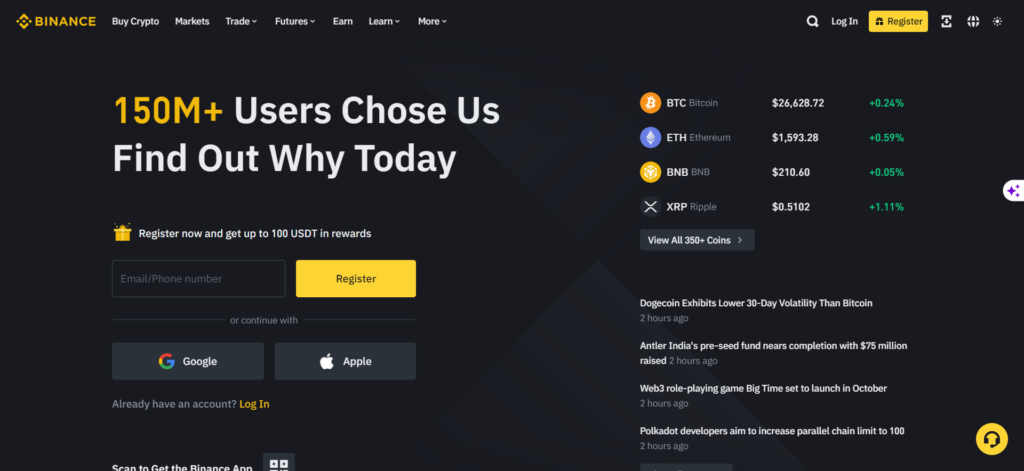
Binance, launched in 2017 by founder Changpeng Zhao, quickly gained immense popularity in the crypto world. It’s not only one of the best crypto exchanges in South Africa but one of the best in the world.
Known for its robust security standards and high trading volume (most recently $5.4 billion a day), it has earned a strong reputation in the industry. The exchange also offers a wide range of features, including spot trading, margin trading, futures, options trading, staking, and live chat for customer support.
What fees does Binance charge?
Binance charges a 0.1% maker/taker fee. But you will get a 25% discount (0.075%) if you use their native token, BNB, for trading. Other than that, you will also pay less fees if you’re a VIP member. Withdrawal fees vary depending on the coins. Check out this page for their complete fee structure.
What cryptocurrencies does Binance support?
Binance supports 150+ cryptocurrencies, including a range of popular and lesser-known coins. Check out their complete list of supported assets.
Is Binance easy to use?
Binance has an interactive and intuitive interface that is easy for beginners. Moreover, the platform also has a Binance Academy section, a perfect onramp for beginners to get started with everything crypto-related. However, Binance is not a beginner-only place. It has enough features, options, and tools for advanced traders and investors too.
2. Bybit

ByBit, founded in 2018, has become one of the top crypto exchanges in South Africa.
While its trading volume isn’t as high as some giants, it still manages a respectable $500 million in 24-hour trading volume. Moreover, ByBit offers a suite of features, including spot trading, margin trading, and futures and options trading. But it stands out with its ByBit savings option, allowing users to earn passive income and yields on cryptocurrencies.
What fees does ByBit charge?
Similar to Binance, ByBit also has a 0.1% maker/taker fee on crypto trading pairs, which is reduced on becoming a VIP member. Here is a complete breakdown of ByBit’s fee structure.
What cryptocurrencies does ByBit support?
ByBit has 100+ cryptocurrencies listed on their platform, including the mainstream Bitcoin and Ethereum and other less-popular tokens, like AAVE, Algorand, Dash, etc.
Is ByBit easy to use?
ByBit has an elegant and simple interface, and similar to Binance, ByBit also has a dedicated ‘Learn’ section for beginners to get started. However, the platform has advanced tools and charts for experienced traders too.
3. Luno
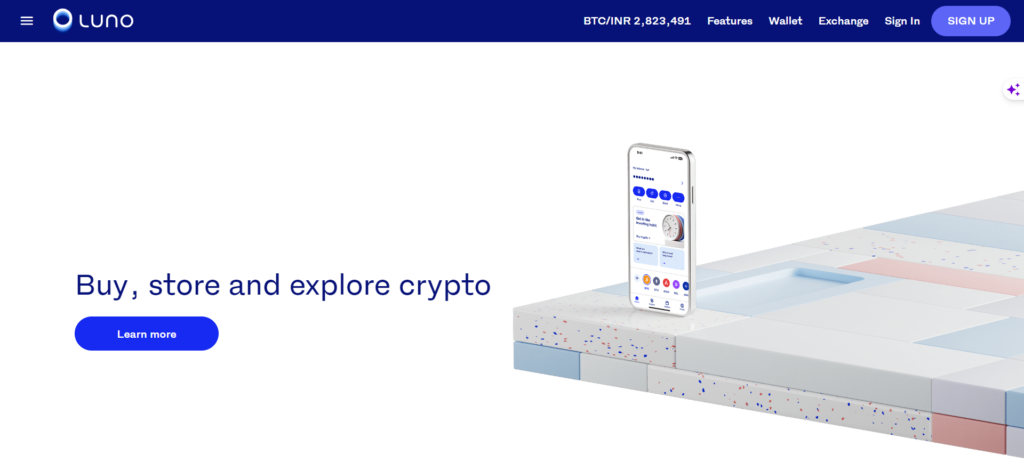
Luno was founded in 2013, making it one of the pioneers in the industry. Luno is renowned for its transparent reputation and stringent security standards, including cold storage for user funds, and valid licenses and registrations in regions they operate in.
Although its daily trading volume is around $4 million, the platform enjoys considerable popularity among South African investors. It even offers a staking option exclusively for its South African user base. And that is what makes Luno one of the best crypto exchanges in South Africa.
What fees does Luno charge?
Luno has some deposit fees in South Africa, depending on the method used to deposit funds. Additionally, Luno charges a 2% buy/sell fee on buying crypto with ZAR. Other than that, there is a 0.4% fee on trading crypto pairs, which reduces as you climb up in tiers. Check out their complete fee structure.
What cryptocurrencies does Luno support?
Compared to other best crypto exchanges in South Africa, Luno has relatively few options. The platform only support the following 12 cryptocurrencies:
- Bitcoin (BTC)
- Ethereum (ETH)
- Ripple (XRP)
- Avalanche (AVAX)
- Litecoin (LTC)
- Cardano (ADA)
- Solana (SOL)
- Chainlink (LINK)
- Uniswap (UNI)
- Bitcoin Cash (BCH)
- USD Coin (USDC)
- Tether (USDT)
Is Luno easy to use?
With its simple and basic design and basic tools, Luno is an excellent platform for beginning crypto investors and traders in South Africa. So, if you’re looking for more advanced features, tools, and support, this may not be ideal for you.
4. Kraken
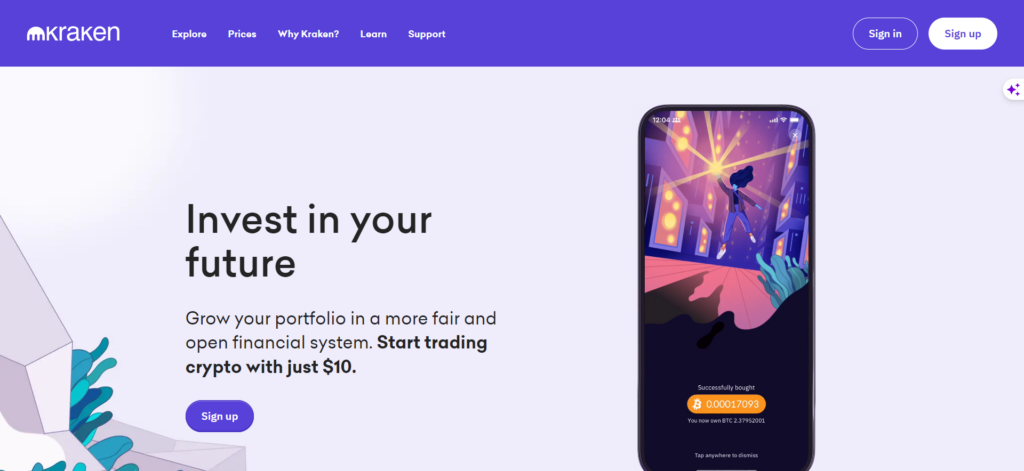
Kraken, among the best crypto exchanges in South Africa, was established in 2011 by founder Jesse Powell. Over the years, it has garnered a massive global following for its stellar security protocols and strong reputation in the industry.
Kraken’s 24-hour trading volume stands at $430 million. Additionally, Kraken offers margin trading on its Pro platform and allows staking on select coins.
Update: Kraken has temporarily halted deposits from South African clients.
What fees does Kraken charge?
Kraken charges varying trading fees based on your 30-day trading volume. For instance, if your 30-day trading volume is below $50,000, you will pay a 0.16% maker fee and a 0.26% taker fee. Check out their complete fee structure.
Moreover, there are costs associated with their Instant Buy features, which is 0.9% for stablecoins and 1.5% for other coins, along with a 0.5% processing fee.
What cryptocurrencies does Kraken support?
Kraken supports a wide variety of 220+ cryptocurrencies.
Is Kraken easy to use?
Yes, Kraken is easy and beginner-friendly. However, Kraken also has an additional platform called Kraken Pro with more advanced features and tools for the veterans.
5. VALR
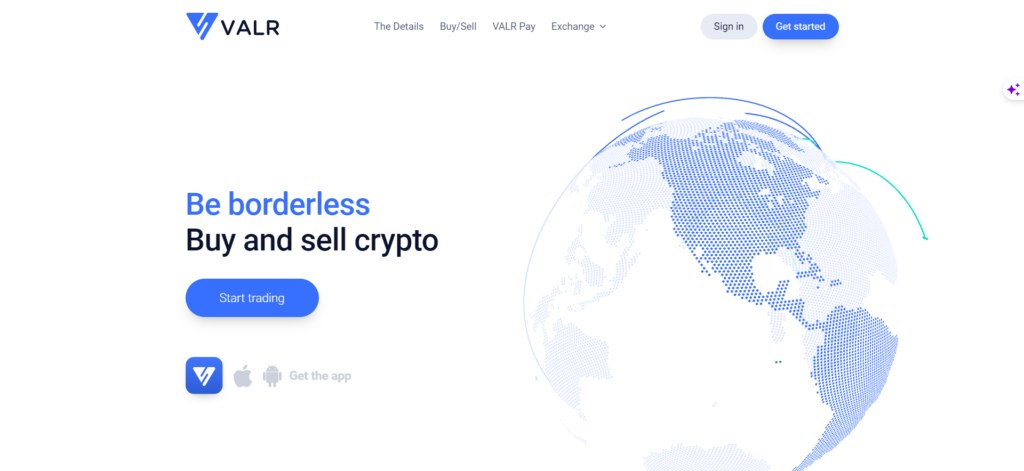
VALR is a native South African exchange launched in 2018. Founded by Farzam Ehsani and Theo Bohnen, it’s steadily gaining popularity for its user-friendly interface and robust security measures, making it one of the best crypto exchanges in South Africa. While its 24-hour trading volume currently stands at $8 million, VALR offers valuable features such as margin trading and staking.
What fees does VALR charge?
VALR charges a 0.03% taker fee on crypto/USDC pairs and a 0.1% taker fee on crypto/ZAR pairs. However, unlike any exchanges in this list, VALR pays its market makers 0.01% of every trade. Check out their complete fee structure.
What cryptocurrencies does VALR support?
VALR supports 60+ cryptocurrencies, including Bitcoin, Ethereum, Litecoin, etc.
Is VALR easy to use?
VALR offers a simple, easy-to-use interface suited for crypto investors and traders of all experience levels. It also has a mobile app that users can use for quick, instant, and convenient transactions.
6. Coinbase
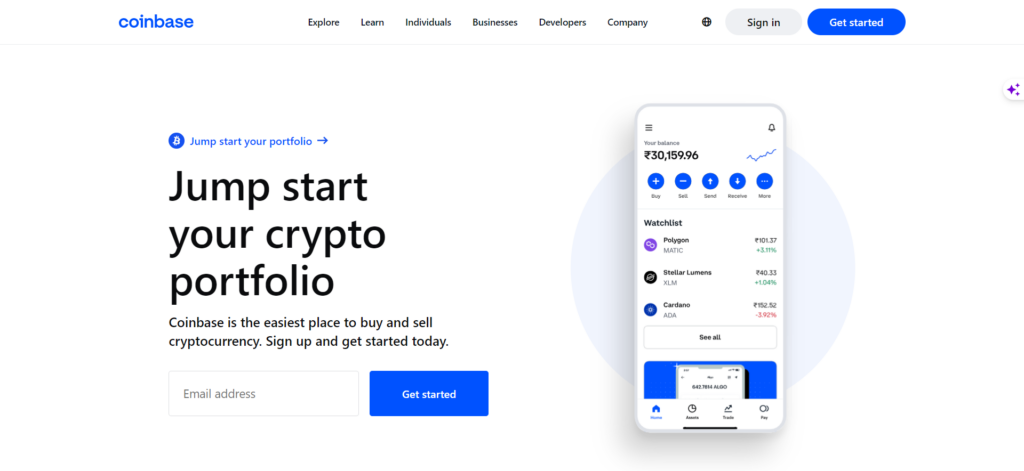
Coinbase, a globally renowned exchange, was launched in 2012 by founders Brian Armstrong and Fred Ehrsam. Its immense popularity stems from a user-friendly interface, a wide range of supported tokens, and strong security standards. Coinbase is one of the rare centralized exchanges that offer non-custodial crypto wallets, providing a good mix of security and control for its users.
The platform boasts a 24-hour trading volume of $700 million. Additionally, it also offers staking services, enabling users to earn rewards on their crypto holdings. This combination of reputation, security, and diverse features makes Coinbase one of the best exchanges in South Africa.
What fees does Coinbase charge?
Coinbase charges a 0.05%-0.60% taker fee and a 0-0.40% maker fee. You will also pay a 1% transaction fee on every crypto transaction and a 1% withdrawal fee on crypto-to-fiat conversions.
What cryptocurrencies does Coinbase support?
Coinbase supports 150+ cryptocurrencies and 9 networks.
Is Coinbase easy to use?
Coinbase has one of the most holistic user interfaces, ideal for both beginners and advanced investors and traders alike.
7. KuCoin

KuCoin, established in 2017, was founded by Michael Gan and has gained popularity for its extensive range of offerings. The exchange maintains a strong reputation for its security standards. With a daily trading volume of $700 million, KuCoin is a reliable choice for South African traders.
Notably, it offers diverse features such as margin trading and futures trading with multiple modes for different trading strategies. Moreover, the platform also offers soft staking options, allowing users to earn rewards without locking in their assets.
What fees does KuCoin charge?
Much like other exchanges, KuCoin charges a tier-based trading fee, starting at a 0.1% maker/taker fee. You will get a 20% discount if you use KuCoin’s native token KCS. Check out their complete fee structure.
What cryptocurrencies does KuCoin support?
KuCoin supports a whopping 700+ cryptocurrencies, including all the major and lesser-known tokens available in the market.
Is KuCoin easy to use?
KuCoin is probably the only platform in this list of best crypto exchanges in South Africa with a complicated not-so-beginner-friendly interface. Therefore, KuCoin is more suitable for intermediate to advanced investors and traders.
FAQ
Which South African crypto exchange has the lowest fees?
Binance offers the lowest fees among all the South African crypto exchanges, averaging just 0.1% for maker and taker orders. Moreover, users can enjoy even further reduced fees by utilizing Binance’s native token, BNB.
What’s the best altcoin exchange in South Africa?
KuCoin supports 700+ cryptocurrencies, offering a massive range of altcoins. However, for the average crypto investor or trader, any of the best crypto exchanges in South Africa would work.
What is the safest crypto exchange in South Africa?
Luno stands out as the safest crypto exchange in South Africa, offering cold storage for user funds and holding valid licenses and registrations in the regions it operates. Nevertheless, all the exchanges listed here maintain a high level of security, ensuring a safe environment for investors and traders.
How can I sell Bitcoin in South Africa?
To sell Bitcoin in South Africa:
Choose an Exchange: Register on a reputable South African cryptocurrency exchange like Luno, VALR, or Binance.
Complete Verification: Complete the necessary identity verification process as required by the exchange.
Deposit Bitcoin: Deposit your Bitcoin into your exchange wallet.
Create a Sell Order: Place a sell order on the exchange, specifying the amount you want to sell and the price.
Execute the Order: Once a buyer matches your order, the trade will be executed.
Withdraw Funds: After the trade is complete, withdraw the proceeds to your bank account.
Tax Considerations: Be aware of tax obligations on cryptocurrency gains in South Africa and ensure compliance.
What crypto exchange is best for beginners in South Africa?
Binance and ByBit, with their easy-to-use and intuitive interface and educational resources, stand out as the best crypto exchanges for beginners in South Africa.
Is crypto legal in South Africa?
Yes, cryptocurrency is legal in South Africa. The South African Reserve Bank (SARB) has issued guidelines for the use of cryptocurrencies, and they are considered a legal form of payment. However, it’s essential to comply with tax regulations and use reputable exchanges for trading to ensure legal and secure transactions.
How is crypto taxed in South Africa?
In South Africa, the taxation of cryptocurrency depends on whether the transaction qualifies for capital gains tax or income tax:
Capital Gains Tax (CGT): If you hold cryptocurrency as an investment for more than three years or if it provides an additional income stream, you may qualify for CGT. The CGT rate is 18%, applicable to 40% of your gains after a tax allowance of R40,000.
Income Tax: Cryptocurrency activities like day trading, mining, staking, or assets held for less than three years are typically subject to income tax. Income tax rates in South Africa range from 18% to 45% on the total taxable income or capital gain.
Check out our complete guide on crypto taxes in South Africa for in-depth insights and nuances.
What are the best crypto exchanges in South Africa?
Binance, ByBit, Luno, Kraken, VALR, Coinbase, KuCoin, Easy Crypto, OKX, and Quidax are the best crypto exchanges in South Africa.